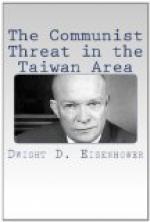If the present bombardment and harassment of Quemoy should be converted into a major assault, with which the local defenders could not cope, then we would be compelled to face precisely the situation that Congress visualized in 1955.
I have repeatedly sought to make clear our position in this matter so that there would not be danger of Communist miscalculation. The Secretary of State on September 4th made a statement to the same end. This statement could not, of course, cover every contingency. Indeed, I interpret the joint resolution as requiring me not to make absolute advance commitments but to use my judgment according to the circumstances of the time. But the statement did carry a clear meaning to the Chinese Communists and to the Soviet Union. There will be no retreat in the face of armed aggression, which is part and parcel of a continuing program of using armed force to conquer new regions.
I do not believe that the United States can be either lured or frightened into appeasement. I believe that, in taking the position of opposing aggression by force, I am taking the only position which is consistent with the vital interests of the United States and, indeed, with the peace of the world.
Some misguided persons have said that Quemoy is nothing to become excited about. They said the same about south Korea—about Viet-Nam, about Lebanon.
Now I assure you that no American boy will be asked by me to fight just for Quemoy. But those who make up our Armed Forces—and, I believe the American people as a whole—do stand ready to defend the principle that armed force shall not be used for aggressive purposes.
Upon observance of that principle depends a lasting and just peace. It is that same principle that protects the western Pacific free-world positions as well as the security of our homeland. If we are not ready to defend this principle, then indeed tragedy after tragedy would befall us.
But there is a far better way than resort to force to settle these differences, and there is some hope that such a better way may be followed.
That is the way of negotiation.
That way is open and prepared because in 1955 arrangements were made between the United States and the Chinese Communists that an Ambassador on each side would be authorized to discuss at Geneva certain problems of common concern. These included the matter of release of American civilians imprisoned in Communist China, and such questions as the renunciation of force in the Formosa area. There have been 73 meetings since August 1955.
When our Ambassador, who was conducting these negotiations, was recently transferred to another post, we named as successor Mr. [Jacob D.] Beam, our Ambassador to Poland. The Chinese Communists were notified accordingly the latter part of July, but there was no response.




